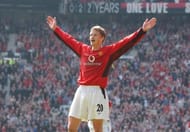Shinji Kagawa, Iago Aspas, Erik Lamela, Edin Dzeko, Thomas Vermaelen, Ashley Cole, Tony Hibbert: The first word that comes to your mind when you hear these names is ‘Bench’. It is a powerful notion- magical enough to transform euphoria to dismay. Each one of the mentioned players belongs to each of the top seven sides of the Barclays Premier League. These are all quality players. They can add value to any team they play for. But there they sit on the bench, waiting for an opportunity to play.
The point to be pondered upon is, is it really their fault? Are their performances so mediocre that they cannot break into the squad? Let us analyse their gameplay and the existing scenario.
Shinji Kagawa: The versatile attacking midfielder, who plays for Manchester United, has featured very rarely. Known for his immaculate passing, whether it a long ball, a short pass or a through ball, he brings unpredictability in the game with his vision and trickery. Irony is, despite being a value addition to the team, he is confined to the bench.
Iago Aspas: His agility to appear in a goal-scoring position at Celta Vigo earned him a move to Liverpool. However, his adaptability to the Premier League is questioned, while Brendan Rodgers wishes to play the centre-forward to play as a false nine- rather difficult for him to adjust to.
Erik Lamela: The £25.8 million man from Tottenham Hotspur, known for his attacking prowess, has the ability to tear apart defences. While at AS Roma, he gelled well with striker Pablo Osvaldo, to score 15 goals in 33 games. However, despite his talent, he has failed to be a regular in the first-team of Tottenham Hotspur under Andre Villas-Boas, as well as Tim Sherwood.
Edin Dzeko: Much was expected from Dzeko after his arrival from VFL Wolfsburg at Manchester City. He scored goals on numerous occasions, but he scored most of them after coming off the bench. Lack of first-team action disturbed him; he even asked for a transfer, but new Manchester City coach Manuel Pellegrini assured him that he is important to the squad. Despite that, he continues to make appearances off the bench.
Thomas Vermaelen: The Arsenal captain has found limited opportunities this season to displace the Mertesacker-Koscielny partnership, which has been burgeoning throughout the season. Despite his goal-saving clearances and powerful headers, his chances of breaking into the squad have all but become negligible.
Ashley Cole: Perhaps one of the best English full-backs ever, Ashley Cole has played a crucial role in all matches that he has played for Arsenal and Chelsea. He always has had an attacking mind, with defence being a role he has to play because of his position. However, the 33-year old, despite still being one of the best in the business, has scarcely appeared for Chelsea of late.
Tony Hibbert: One of the very few one-club men in the world, Tony Hibbert has always been a passionate Everton player. Despite having never scored a goal in his professional career, he has played an instrumental role as a right-back in the Toffees’ success under David Moyes. But he has made only 1 appearance in the league this season.
Every player has his own abilities; it is the player’s skill and performances that should catch the coach’s eyes. But despite that, it is difficult for the players to break into the squad because of a multitude of reasons. Most coaches say, the players have to show a spark in training, or there should be enough competition among the players to deliver their best performances on the field. The fact is that some players don’t fit into the coach’s style of play.
Let us analyse few of the above examples. David Moyes’ focuses more on the 4-4-2 formation. But given his tactics, it leaves a hole in the midfield attacking position. The players’ inability to attack the opposition leaves a detrimental impact on the morale of the team. Though Kagawa is a direct solution to these problems, he remains on the bench. This is an example of how it is difficult for a player to appear in the first-team squad, when the tactics don’t suit the player.
But what happens when a player fails to make an impact? Iago Aspas, the promising talent from Celta Vigo, was given ample opportunities to shine in the team. However, in many cases, he failed to convert the chances gifted to him. Rather, he has found it excruciatingly difficult to adapt to the physical style of the Premier League. Also, Rodgers plays him out of his preferred position, more as a false nine, rather than the centre-forward position.
Whether the player plays or not, there is sizeable impact on the player’s self-esteem. There have been calls for Kagawa to get him back to Borussia Dortmund. But he stayed back at Old Trafford. Aspas has been frustrated because of lack of opportunities. But Liverpool have not allowed him to even move out on loan. Dzeko was given hopes that he is still an important player.
Iker Casillas, perhaps, has been one of the most famous players to be on the bench these days. Players like these are hot property in the transfer market, but they lose their sheen when they are not allowed to move out, and in turn lose market value, which affects their morale too.
There are few players like Micah Richards, who are very committed to their clubs. He was told by Manchester City that he can leave if he wanted to. But he chose to stay and work hard. Though he has only managed 9 appearances so far this season, his will-power and dedication, coupled with skills can reap benefits. This creates a positive impact on upcoming football academy graduates, who can idolize players, and become diligent enough.
There is a concept called super-sub, where the player comes off the bench and scores important goals. The first name to pop up into the mind is Javier Hernandez. The Manchester United striker has scored plenty of goals after coming off the bench. Edin Dzeko has a thick share of goals to his name as a super-sub. However, the name worth mentioning is Ole Gunnar Solskjær, who scored the dramatic last-gasp winner in the 1998-99 UEFA Champions League final against Bayern Munich.
There are players who have been bench-warmers ever since their arrival at the club. But relevant factors can influence their inclusion in a team. Samir Nasri is the perfect example for such a player. He largely made appearances from the bench under Roberto Mancini, despite being a regular for Arsenal. However, ever since Pellegrini took over, there has been some kind of a revolution for Nasri. He went on to make numerous first-team appearances. And as expected, he delivered eye-popping performances.
When the world knows about the quality of a player, they look forward to watch him play. But it was an unwelcome sight at Stamford Bridge. Juan Mata, the Spanish magician in the Premier League, unfortunately fell down the pecking order under Jose Mourinho. However, whenever he was given a chance to play, he performed well. Manchester United pounced on the opportunity to sign him, once Chelsea made him available. Ever since his £37.1 million move, he has been a regular in the Red Devils’ squad. From bench-warmer for one club to key performer for another club- that is a journey for which everyone wants to be on board!
Whatever the future action plan is for bench-warmer, it is clear that life as a football player is unpredictable. The player can find himself in desperate situations to make an appearance in a squad. The player when given a chance can forget his own style of play, and become selfish enough to prove a point. The player can get frustrated, and at times, even announce premature retirement. Some players are patriotic; they want to feature so that they can give their best and represent their nation. So, they will not let anything come in their way.
It is always the player’s and the club’s decision to decide the role of the player. The player himself has his wishes to play at his natural position. But when the player performs his best, and stands firm on being a part of the first team, it is the manager who has the upper hand in such decision, hence making it a cyclic process!



